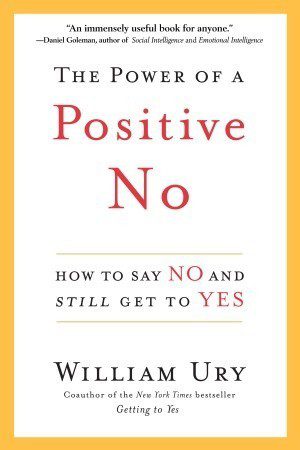Title: The Power of a Positive No: How to Say No and Still Get to Yes
Author: William Ury
First published January 1, 2007
272 pages, Hardcover
ISBN: 9780553804980 (ISBN10: 0553804987)
Rating: 4.01
Overview
In his book, The Power of a Positive No: How to Say No and Still Get to Yes, William Ury provides a guide for anyone who finds themselves needing to say no, whether it’s in the workplace, at home, or in their community. Ury recognizes that saying no can be difficult, but he also knows that it’s a crucial word for protecting oneself and standing up for what matters most.
The key to saying no without destroying relationships lies in the art of the Positive No, a technique that Ury breaks down into three simple steps. This book offers concrete advice and practical examples for saying no in any situation, from your boss to your spouse.
In a world where the pressure to say yes grows every day, The Power of a Positive No is an indispensable tool for anyone who wants to learn how to say no clearly, respectfully, and effectively while still getting to yes.
About the Author
William L. Ury is an accomplished negotiator, and co-founder of Harvard’s Program on Negotiation.
He currently leads the Global Negotiation Initiative, and has authored several books, including The Power of a Positive No and Getting to Yes. The latter has sold over five million copies, and is highly regarded by experts in the field.
Ury has advised on negotiations ranging from corporate mergers to international conflicts, and co-founded the International Negotiation Network with former president Jimmy Carter. He has also taught negotiation to various groups, including corporate executives, diplomats, and military officers.
In addition to his negotiation work, Ury is also a co-founder of e-Parliament, an online forum for members of congress and parliament worldwide to discuss legislative solutions and global problems. He also created the Abraham Path Initiative, which aims to bridge the gap between the world of Islam and the West by creating a permanent pilgrimage path in the Middle East.
Ury’s work has received numerous awards, and has been featured in various media outlets.
Ury’s background in social anthropology has allowed him to conduct negotiation research beyond the boardroom and bargaining table, including among the Bushmen of the Kalahari and the clan warriors of New Guinea.
Editoral Review
The Power of a Positive No: How to Say No and Still Get to Yes by William Ury is a practical guidebook for anyone who wants to learn how to say no in a way that will lead to positive outcomes. Ury is a well-known negotiation expert and co-founder of Harvard’s Program on Negotiation.
He has written several books on the topic of negotiation, including the bestseller Getting to Yes. In The Power of a Positive No, Ury focuses on the importance of saying no and provides a step-by-step approach to delivering a positive no.
The book is written in a clear and concise style that is easy to follow. Ury uses real-life examples to illustrate his points, which makes the book both engaging and informative.
He also provides practical exercises and tools that readers can use to develop their own positive no.
The Power of a Positive No is divided into three parts. The first part explains the concept of a positive no and why it is important.
Ury argues that saying no is a necessary part of negotiation and that a positive no can be a powerful tool for achieving one’s goals. The second part provides a step-by-step approach to delivering a positive no, including how to prepare for a negotiation and how to deliver the no itself.
The third part focuses on how to use a positive no to build relationships and create win-win outcomes.
One of the strengths of The Power of a Positive No is Ury’s emphasis on the importance of relationships in negotiation. He argues that negotiation is not just about getting what you want, but about building relationships that will be beneficial in the long run.
He also stresses the importance of understanding the other party’s perspective and finding common ground.
Another strength of the book is the practical exercises and tools that Ury provides. These tools are designed to help readers develop their own positive no and apply it in real-life situations.
Ury also provides examples of how these tools have been used successfully in various contexts, which makes the book even more compelling.
One weakness of the book is that it can be repetitive at times. Ury reiterates some of his points throughout the book, which can be frustrating for readers who are looking for new insights.
Additionally, some of the examples that Ury uses are a bit dated and may not resonate with younger readers.
Overall, The Power of a Positive No is a valuable resource for anyone who wants to improve their negotiation skills. Ury’s practical approach and emphasis on relationships make this book a must-read for anyone who wants to achieve positive outcomes in their negotiations.
I would highly recommend this book to anyone who wants to learn how to say no in a way that will lead to positive results.
Rating: 4 out of 5 stars. This book is well-written, engaging, and full of practical advice.
The only downside is the occasional repetition and outdated examples.



